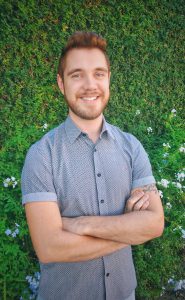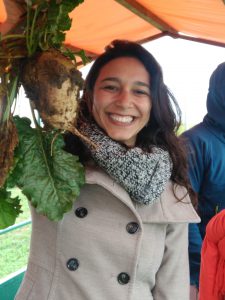Students’ projects
Thiago Neitzel describes his Ph.D. project as follows
Due to variations and elevation of costs of fossil fuel production and the climate changes caused by their use, there is an increase in the search for alternatives that seek new energy sources. In this context, my project proposes the study of the yeasts Scheffersomyces stipitis and Spathaspora passalidarum through fermentation reactions of hydrolyzed sugarcane bagasse with cell recycle in fed batch systems. Later, transcriptomic analysis will be performed, in order to verify the level of expression of genes encoding enzymes involved in the conversion of pentoses to ethanol. Regarding the study of yeasts, the study of S. passalidarum has no precedents and, considering the consumption of pentoses by S. stipitis, the project will take a deeper exploration. Concerning the courses offered within the Ph.D. Program in Bioenergy, I think that a great amount of knowledge which will be discussed during the lectures will be applied in my project and benefit my current and future professional career.
A
A
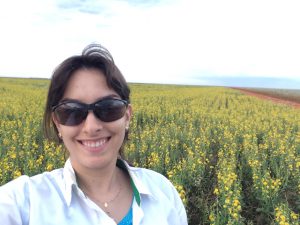 Here is what Ph.D. candidate Sarah Tenelli thinks about her research project and the Ph.D. program in Bioenergy
Here is what Ph.D. candidate Sarah Tenelli thinks about her research project and the Ph.D. program in Bioenergy
My research is focused on the best management practices to improve the use of nitrogen fertilizers for sustainable production of sugarcane. The role of crop rotation with legumes, straw removal and successive applications of nitrogen fertilizers are being investigated under field conditions at both soil and plant perspectives in sugarcane ratoon growing. My aim is to evaluate the residual effect of N-fertilizers and straw removal under legume rotation system over four crop seasons and their impacts on soil carbon and nitrogen stocks, crop growth and yield. This Program has been a great opportunity to enriching and having a deeper advancement in bioenergy area. The international integration with professors and students of different institutions has been a great experience for my future career.
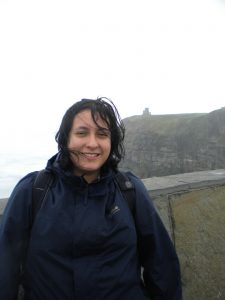 Ph.D. candidate Maria Paula describes her research project
Ph.D. candidate Maria Paula describes her research project
My PhD project envisions the co-digestion of dry cheese whey and microalgae for the production of biofuels in alkaline pH. Whey is a by-product of the dairy industry presenting a high organic load. Currently, about 31,137 million tons of cheese whey are utilized as animal feed, fertilizer and/or discarded. Considering that the discharge of part of this whey into hydric bodies poses environmental consequences, this surplus can be used for the production of biofuels giving economical potential to this raw material. Microalgae could be a suitable option to reduce both inorganic and organic load of cheese whey. Aside their great photosynthetic efficiency, microalgae do not compete with land for the production of food crops, and their lipids can be used in biodiesel production. By developing alternative technologies for processing this raw material to biofuel through an AD process, it is guaranteed the non-discharge of whey into hydric bodies and consequently, the minimization of eutrophication and other environmental impacts caused by dairy production, especially in locations where it is difficult to convert it into other value-added products due to poor infra-structure, lack of industries and small/medium size farmers’ know-how. I believe that during the PHD program in Bioenergy we are exposed to a great variety of knowledge encompassing not only biomass conversion into biofuels but also the social, economic, scientific and technical fields associated with bioenergy, thus giving us a competitive edge professionally and enabling us to be more engaged in the world´s eminent biobased economy.
Ph.D. candidate Larissa Noel describes her research project
The extraction of juice is one of the first and main stages of sugarcane processing and can be done by mills and diffusers. Techno-economic studies show that, with the existing technology, excessively expensive equipment are needed for obtaining slightly higher juice extraction rates. Considering diffusers, one possible option to increase sucrose extraction rates without modifying its main physical structure, is to redesign the connections among different stages of the equipment. In typical operating conditions, the percolating fluid that leaves each stage is pumped only to a further stage. However, if part of the fluid is pumped to previous stages or is recirculated to the same stage itself, higher rates of mass transfer can be achieved. In this context, my research focuses on: (1) developing a model for the simulation of sucrose extraction in multi-stage sugarcane diffusers considering the possibility of connection among all diffuser’s stages; and (2) performing mono and multi-objective optimizations of sugarcane diffusers in order to reach maximum sucrose extraction efficiencies under different operating conditions. In the PhD program in Bioenergy, I had the chance to deepen my knowledge in bioenergy and learn more about biomass conversion into biofuels, bioproducts and biomaterials. The course has a rich multi-disciplinary approach, what in my opinion is essential for someone that wants to specialize in the Bioenergy area. During the course, for example, I had lectures that covered topics related to biology, engineering, economics, agriculture and environment, all inside the Bioenergy main area. Furthermore, the integration of the three Brazilian universities and the partnership with international universities were of great help for me for networking and cooperating with colleagues and professors from different institutions and with different backgrounds.
 Ph.D. candidate Vanessa Costa Iurif describes her research project
Ph.D. candidate Vanessa Costa Iurif describes her research project
The industrial etanolítico fermentativo process does not occur in a aseptic environment. The consequence is a high level of contaminants in fermentation tanks, which is responsible for significant economic losses. A common phenotype observed in mills due to the presence of contaminants is flocculation. Flocculation reduces the productivity of ethanol and also affects the cell recycle, increasing production costs. In order to assist the alcohol industry for better decision-making, my PhD project aims to identify metabolic factors that contribute to the flocculation phenotype during ferment ation and also identify biomarkers that precede these processes. The opportunity of meeting researchers and students from other institutions, the interdisciplinary character of the program and masterclasses with influential leaders and teachers from different parts of the world will contribute significantly to my scientific formation.
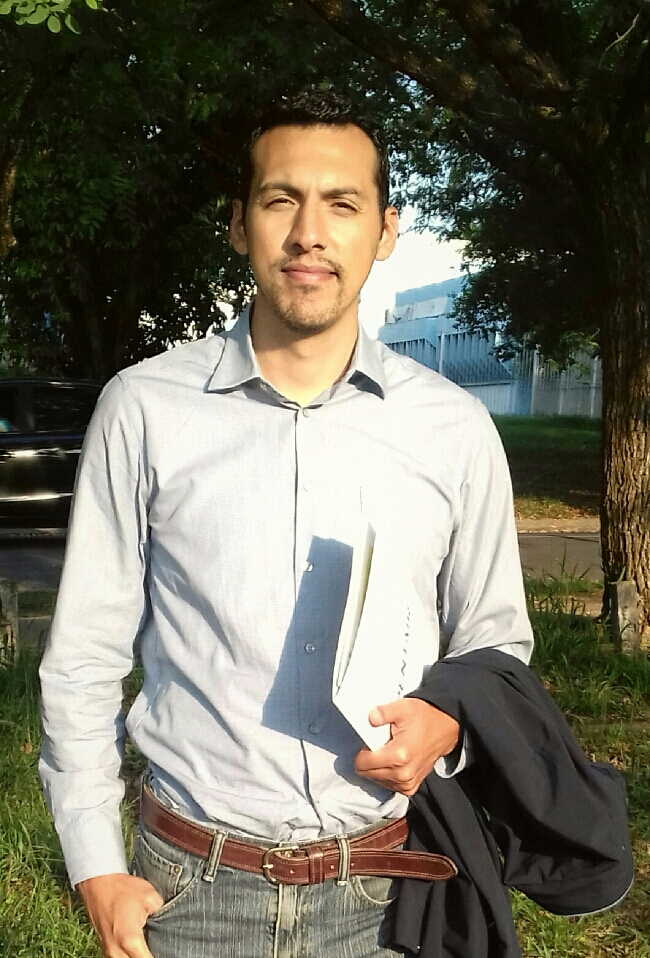 Here is what Ph.D. candidate Rodolfo Silva thinks about his research project and the Ph.D. program in Bioenergy
Here is what Ph.D. candidate Rodolfo Silva thinks about his research project and the Ph.D. program in Bioenergy
Since my arrival to Piracicaba, the PhD Program in Bioenergy has been to me a great opportunity to learn and gain proficient experience about the diversity and importance of bioenergy technologies nowadays. At the same time, I have been able to develop state-of-the-art research of Waste to Energy in an always friendly and supportive environment. My research is titled: “Dry anaerobic digestion potential for agricultural residues and municipal organic waste treatment in Brazil, Colombia and Mexico”, which I have been developing with the direct advice of my supervisor in São Paulo. I hope this research will contribute toimprove waste treatment systems and diffuse bioenergy technologies in Latin America and the Caribbean countries.
A
A
Here is what Ph.D. candidate João Pacheco thinks about his research project and the Ph.D. program in Bioenergy
As a graduated forest engineer, I joined the Ph.D. bioenergy program in March 2017. So far, I feel very satisfied and content with the knowledge I have acquired and hope to keep on learning. My project is about quantify and study forest-waste biomass from forest harvesting and timber industries, in order to create appealing economic scenarios for heat and electricity generation. The greatest experience for me in this Ph.D. program has been the multidisciplinary approach and diversity of the students from other nationalities, allowing a vast exchange of ideas and information.
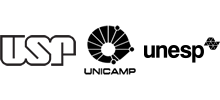
 Imprimir
Imprimir